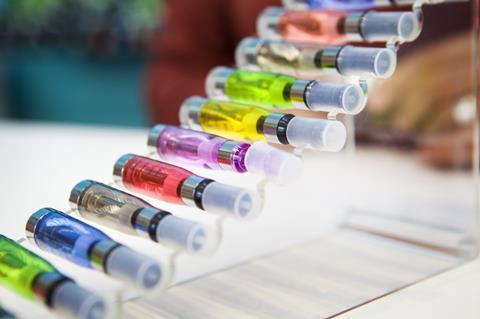
Throwaway vapes are a smash hit. They’ve helped the vaping category more than double its value this year to £793.2m. Elf Bar is now the most valuable e-cig brand by a considerable margin, worth £322.1m in grocery, having shifted an extra 55.8 million units.
Victor Xiao, chief executive of Elf Bar, puts it succinctly: “We’ve been a phenomenal retail success in the UK market.”
Further success looks likely for the brand, which expanded in October from its c-store heartland into Tesco.
Elf Bar’s disposable rivals are looking good, too, despite growing concerns about plastic waste. Geek Bar has boosted volumes by 613%, newcomer Elux has made £36.8m, and Hyppe makes its debut in the ranking at number 12, with 1.2 million devices sold.
“The growth of disposable vapes was largely unpredicted and, even for those that had an inkling it was coming, the scale and pace has been unprecedented,” says Harris Tanvir, co-founder of UK Ecig Store.
Predicted or not, the boom in disposables comes at a cost to the sales of rechargeable devices from tobacco powerhouses.
“Since the summer of 2021, the disposable segment has become number one by reaching more than 60% value share in the latest 52 weeks, pushing closed-system products to second place with a bit below 20% value share of e-cigarettes,” explains NielsenIQ analyst Laszlo Zsom. “Major brands in the closed systems segment were negatively impacted by the fast growth of Elf Bar and similar disposable brands.”
Indeed, last year’s biggest vaping brand, Juul, has slipped to fourth after dropping 14.7% of volumes at a cost of £7.5m. BAT’s 10 Motives brand suffered a 4.7% dip in volumes, Imperial’s Blu fell 6.7% and JTI’s Logic shifted only around half 2021’s volume. Only BAT’s Vuse (formerly Vype) bucked the trend, growing value by 458%.
“We continue to extend our value share leadership position, with Vuse achieving 34.7% value share in the top five markets globally, despite the rapid growth in disposables,” said BAT chief executive Jack Bowles earlier this year.
Vuse’s weathering of the disposable storm is part thanks to BAT’s own throwaway product, Vuse Go, which launched in the UK in May. It was the result of “our fastest speed to market launch yet” – just six months – and “is expected to drive margin accretion, once at scale”, Bowles added.
The outlook is bleaker for less fortunate rivals, Zsom suggests. “Brands that were seeing significant growth years ago now face losing range availability too.”
It’s an equally gloomy picture for the cigarette sector. Units have fallen 11.7%, hitting value to the tune of £795.1m.
The top nine brands are all in decline. They’ve lost £766.9m between them and shifted 135.7 million fewer packs as average price surged by as much as 8.5%. Number 10 Richmond only bucked the downward trend thanks to a 12.1% drop in average price.
“Major brands are impacted similarly by the constellation of factors that drive the category’s decline,” Zsom says. “We found that the pandemic induced changes in our lives. Things like closed borders and no international travel had a much bigger impact on the category than the menthol ban, actually helping it grow.
“With life returning to normal, this temporary tailwind vanished and the category is back to expected decline. Paired with this, there is stellar growth happening in e-cigarettes.”
Maybe that’s because vapes, with an average price per pack of £4.80, offer greater value per puff versus cigs at £10.80.
“The cost of living crisis is expected to further negatively impact factory-made cigarettes’ market size, putting a squeeze on smokers’ budgets,” Zsom adds.
Smoke-free future
Further decline for ciggies looks inevitable, as the number of smokers falls each year.
The most recent ONS figures show just 14.1% of UK adults were smokers in 2019, which “continues the trend in falling smoking prevalence since 2011”.
In response, major tobacco suppliers have doubled down on their dream of a ‘smoke-free future’. JTI, for instance, launched its latest generation Ploom X heated tobacco device in November, while Philip Morris unveiled a “revamped and renamed version” of Iqos 3 Duo, now called Iqos Originals Duo.
While take-up of heat-not-burn devices remains minimal, “we estimate the category will be worth £250m by 2025”, says Mark McGuinness, marketing director at JTI UK. “So, there is really no better time to expand and upgrade our portfolio.”
Brands hope to communicate the cost savings versus cigarettes. “Affordability is a growing concern among many adult smokers in the UK,” says Kate O’Dowd, UK head of commercial planning at Philip Morris, highlighting that 20 Iqos refills cost £5 – less than half the average price of a pack of cigs.
That can only be good news for cash-strapped smokers.
Top Launch 2022
Vyko Paper Bar | UK Electronic Cigarette
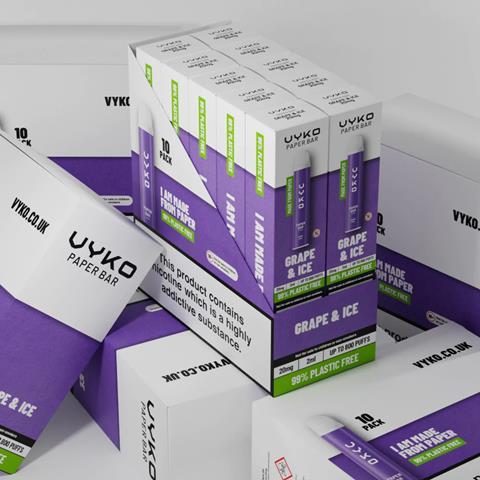
Disposable vapes are booming. That’s great for the category, but not for the environment. More than half end up in landfill, enough to cover 22 football pitches every week, according to not-for-profit Material Focus. The plastic is the main problem – which Vyko is tackling with its ‘99% plastic-free’ disposable, the UK’s first. The device contains 2ml of e-liquid, delivering up to 800 puffs, and full flavour is assured by an organic cotton wick. Also, the battery can be literally ripped out and recycled.
Topics
The Grocer Top Products Survey 2022: How can brands stay in focus?
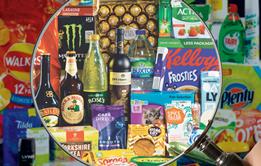
Commodity price hikes, the war in Ukraine and inflation have changed the way Brits shop in the past year, while also piling pressure on suppliers and retailers. Which brands and categories have negotiated the system shock best?
- 1
- 2
- 3
- 4
- 5
- 6
- 7
- 8
- 9
- 10
- 11
- 12
- 13
- 14
- 15
- 16
- 17
- 18
- 19
- 20
- 21
- 22
- 23
- 24
- 25
- 26
- 27
- 28
- 29
- 30
- 31
- 32
- 33
- 34
- 35
- 36
- 37
- 38
- 39
- 40
- 41
- 42
- 43
- 44
- 45
 Currently
reading
Currently
reading
Tobacco & vaping 2022: Disposable vapes drive stunning growth























![Cheese ]GettyImages-664658023](https://www.thegrocer.co.uk/Pictures/80x50/1/8/6/282186_cheesegettyimages664658023_540979.jpg)













































![Cheese ]GettyImages-664658023](https://dmrqkbkq8el9i.cloudfront.net/Pictures/80x50/1/8/6/282186_cheesegettyimages664658023_540979.jpg)





























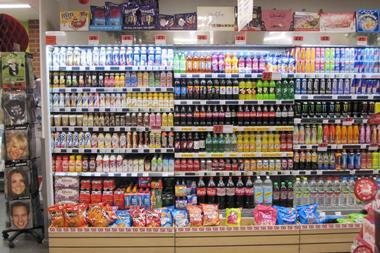
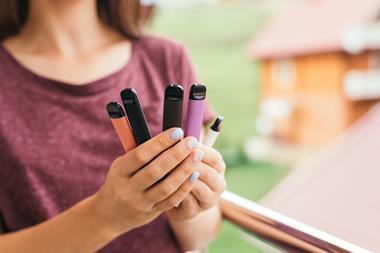
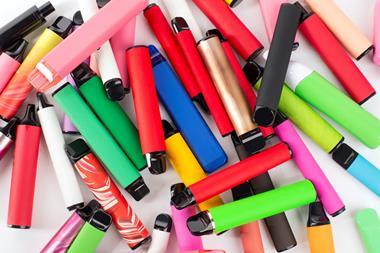








No comments yet